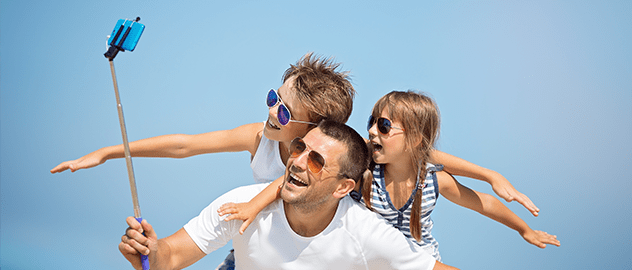
Journey for one smile... to the camera and scanner
Content
The COVID-19 pandemic could cut tourist travel this year by around 60 to 80 percent, the UN-affiliated World Tourism Organization (UNWTO) said in May. Already in the first quarter, when the coronavirus did not reach everywhere, traffic decreased by more than a fifth.
This means that even more than a billion fewer people will travel, and losses worldwide could exceed one trillion dollars. Tens of millions of people could lose their jobs. It looks very bad, but many people who live off tourism and travel, as well as those who want to travel, do not break down and try to adapt to pandemic and post-pandemic times. An important role in this is played by technologies developed over the years, the introduction of which can be significantly accelerated in new times.
People want and need to travel
In Italy, hard hit by the coronavirus, preparations began in May for the most difficult summer season in history. Special security measures have been developed to limit the beaches. for example, on the Amalfi coast in the south of the peninsula, all mayors have already agreed to create a single application with which it will be possible to reserve a place on the beach.
In the local town of Maiori, the authorities decided that the city guards would walk among the sunbathers and enforce the rules. They will fly over the beaches patrol drones. In Santa Marina, Cilento region, a plan was developed with a distance of at least five meters between umbrellas and sun loungers for each family. One such place can accommodate a maximum of four adults. Everyone will be given personal protective equipment upon entry. They will also have to identify themselves and take their temperature.
On the other hand, Nuova Neon Group has designed special plexiglass partitions that will be separate sunbathing areas. Each such segment will have dimensions of 4,5 m × 4,5 m, and the height of the walls will be 2 m.
As you can see, Italians, and not only them, firmly believe that people will want to come and relax on the beach even during the threat of a pandemic (1). “People’s desire to travel is an enduring trait,” TripAdvisor wrote in response to Business Insider questions. “After SARS, Ebola, terrorist attacks and numerous natural disasters, it was clear that the tourism industry was constantly recovering.” Various studies point to this. for example, a LuggageHero survey of 2500 Americans found that 58 percent. of them plan to travel between May and September 2020, unless their destinations are quarantined. A quarter of survey participants said they would avoid big cities and public transport, while 21% said they would not use public transport. will travel around his country.
Konrad Waliszewski, co-founder of TripScout, told Business Insider, citing a survey of XNUMX users, that “people are itching to get back to travel,” but he stresses that the coronavirus crisis is sure to come as a shock and an impetus for big changes in tourism. “People need to travel. It is a fundamental aspect of humanity,” notes Ross Dawson, author and futurist, in the same article, predicting that while the path to returning to normal will not be easy, a return to the road is inevitable.
The world of travel and tourism must get back on track also because a huge part of the economy and the livelihoods of millions of people depend on it. It is estimated that over 10% of people work in this industry. working people in the world, from farmers delivering food to hotels to drivers transporting tourists. However, the view that recurs in many analyzes and forecasts is that the way we travel and spend holidays will undergo a dramatic change.
Experts say the key tool technology will be in the revival of tourism. They include the distribution of e-passports, identity cards, health certificates (2), boarding passes confirming safety, medical tests at many places and strategic points during the trip, as well as an increase in automation and robotization of services. Hotels, airlines and the sea will be forced to provide travelers with a controlled and safe space to relax.
There are teleconferences - there may be teletravels
3. Booking a flight using the KLM chatbot on Facebook Messenger
Many innovations in the tourism sector continue for years. When one keeps track of new technologies, they don't seem particularly new. However, COVID-19 could significantly speed up the adoption of some solutions, such as machine learning for communicating with customers. Currently, AI is being used to quickly respond to customer needs and questions and then provide information requests when customer support is not available.
Many companies are testing, for example, systems for booking and communication through AI-based chatbots, mobile messaging, and systems based on voice interfaces. Assistants such as Siri, Alexa or IBM's Watson Assistant can now guide you through the entire travel process, from advising on travel ideas to booking flights and hotels to guiding you on the spot.
KLM, for example, has created a passenger information service using Facebook Messenger. This system, after booking, sends to the user information about his ticket through a mobile communicator (3). In doing so, he also provides him with a boarding pass or flight status updates. The user has all the up-to-date information about their trip at their fingertips with a handy application that they already use, while they have to download any other documents and reach for other tools.
Another long-growing area of technological innovation is this. Commonly known solutions are rapidly evolving. Today, there are more than three hundred different payment instruments in the world, most of which are based on smartphone applications. Of course, payment systems can be integrated with the above methods to support mobile AI. The Chinese are already massively using the integration of payment instruments with instant messages, for example, through the WeChat application.
With the development of mobile solutions, a new form of solo travel (but already in a social company) may emerge. If the pandemic has developed teleconferencing, then why not help it develop “teletravel”, that is, travel together in isolation from each other, but in constant online contact (4). If we add to this the possibility of constant remote communication with a representative of a travel agency, an agent (even with a virtual assistant!), The image of a new kind of processed technological travel in the post-COVID world begins to take shape.
To the world of travel (AR) or virtual (VR). The former can serve as a tool to help and enrich the traveler's experience (5), integrated with the aforementioned communication and service methods. Importantly, enriched with data from epidemic information systems, it can serve as an invaluable tool in the field of health security in modern times.
5. Augmented Reality
Imagine combining sanitation data or epidemic monitors with AR applications. Such a tool could inform us where it is safe to go and what places to avoid. We write about virtual reality and its potential functions in a separate text in this issue of MT.
The logical extension of innovation is to fill the world of travel with the Internet of Things (IoT), Internet-connected sensor systems in cars, suitcases, hotels and more. Some hotels, such as the Virgin Hotel, have long offered their customers an app that allows them to interact with the room thermostat or control the TV in the room. And this is just an introduction, because sensors and IoT machines will be a source of information about the level of security and possible epidemic threats associated with places and people.
Huge clouds of big data, data generated by networks of smart devices, can create entire safety maps in given areas that can be as important to a traveler as maps of trails and tourist attractions.
All these new tourism tools will work the way they do. In addition to transmitting twenty times faster than before, 5G allows us to develop and implement technologies that 4G cannot handle. This means that the connection between smart IoT devices will be more efficient. This will allow for the so-called "immersive tourism" or "immersion" in data. Initially, it was thought mostly in the context of enriching the travel experience. Today we can talk about "immersion" in a safe zone and control of the environment on an ongoing basis.
Security, i.e. constant surveillance
6. Coronavirus - a new dimension of surveillance
The new post-COVID tech era in the world of travel ranges from fairly simple solutions, such as eliminating doors that require touch, to much more advanced systems, such as gesture-based interaction and biometrics in places that require identification and input. They are also robots, and even equipped with ultraviolet spotlights that constantly clean surfaces, which we know from the IoT network and methods for serving this data (AR). It is artificial intelligence that guides our journey to a much greater extent, from scheduling public transport to checking security when boarding a plane.
All this also has potentially negative consequences. Automating transportation and removing people from most touchpoints, which removes the fully human dimension of travel, is just an introduction to the problems. Much more dangerous is the prospect of surveillance at every turn and complete deprivation of privacy (6).
Already in the pre-coronavirus era, the tourist infrastructure was overflowing with cameras and sensors, which were in abundance in terminals, train stations, on platforms and at the gates of airports. New ideas not only develop these systems, but also go beyond simple observation through visual observation.
Post-vision surveillance systems are designed to provide transportation systems with powerful risk management tools well in advance of a threat. In cooperation with medical information systems, potentially ill passengers and drivers will be identified at an early stage and, if necessary, treated and quarantined.
Such surveillance systems have the potential to be almost omniscient and know for sure, for example, more than the controlled person himself knows. For example, through apps like Singapore or Poland that track contacts with potentially sick people, they could tell if you were infected before you even knew it. In fact, you will only know when your journey is over because the system already knows that you probably have a virus.
